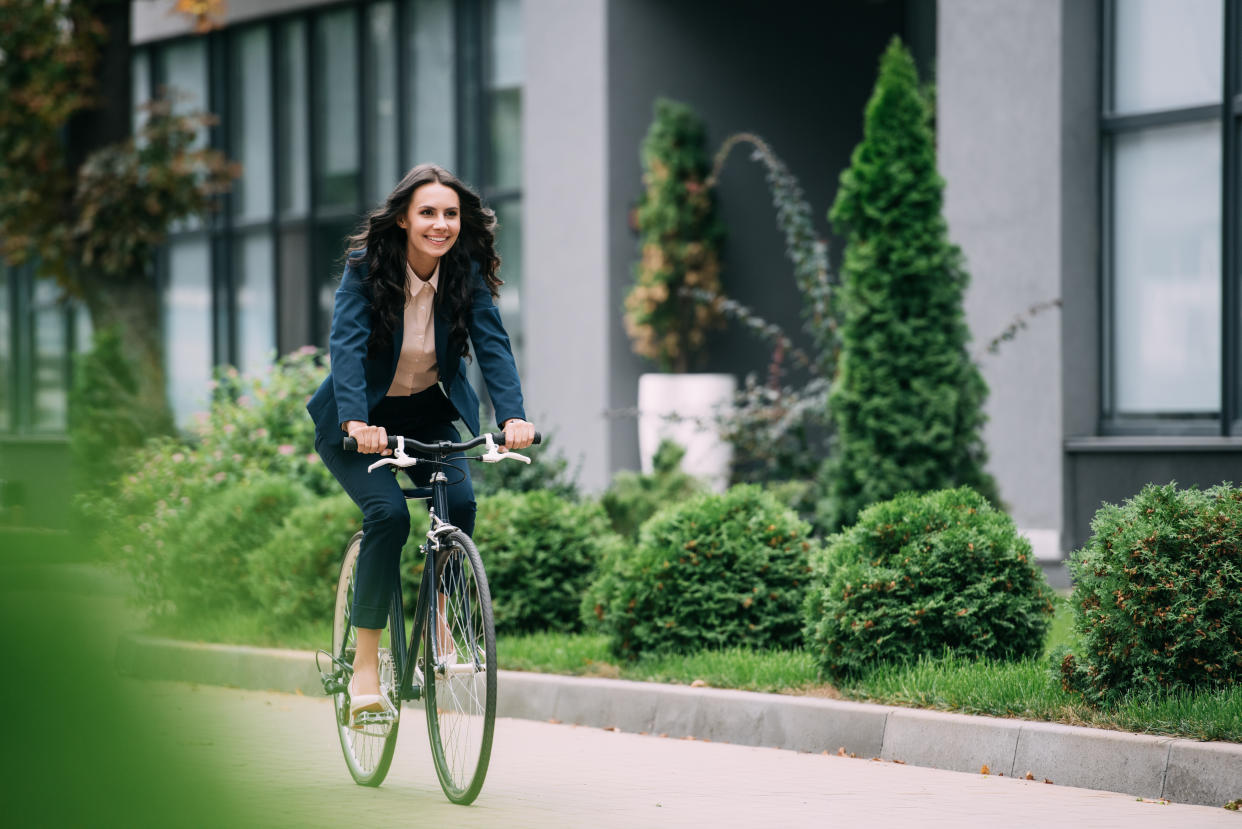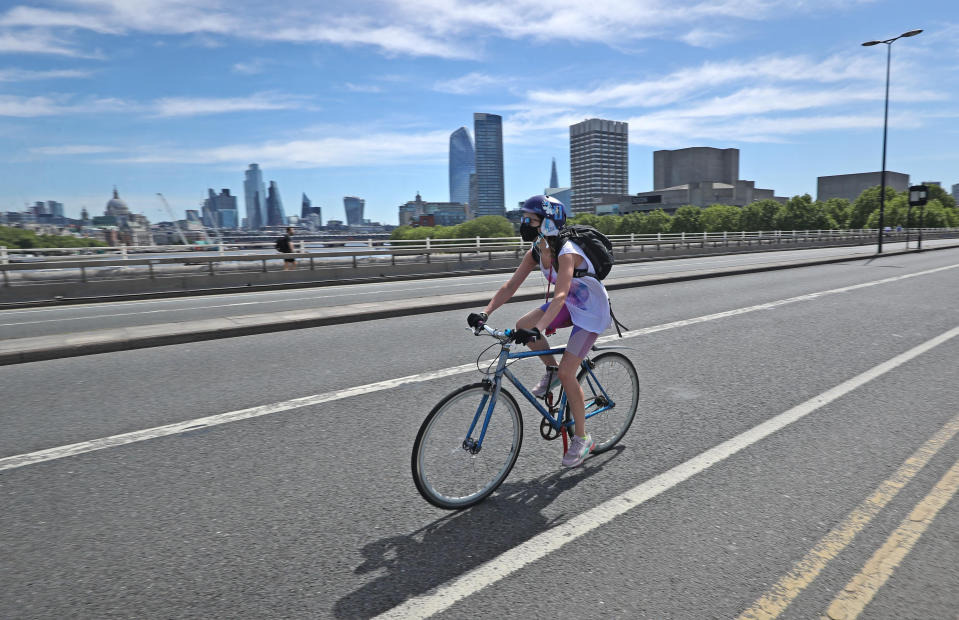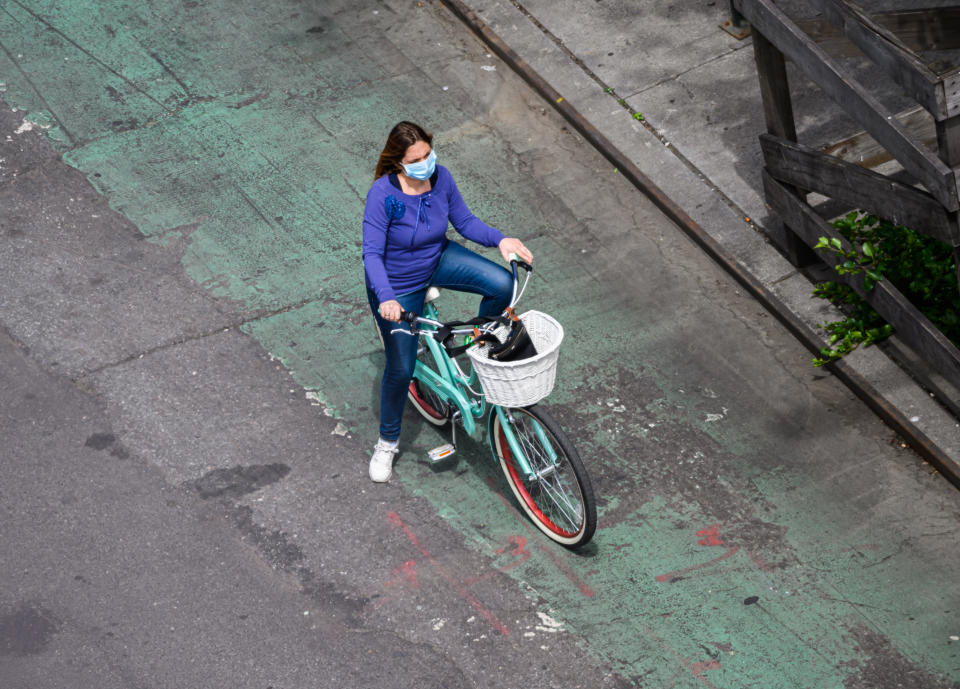Cycling to work could ward off an early death

Cycling or walking to work may ward off an early death, research suggests.
Amid the coronavirus outbreak, people who cannot work from home are being encouraged to “return to the office”.
Read more: Running up the stairs could add years to your life
With the confined space of public transport leaving commuters at risk, Boris Johnson has urged Britons to drive – or better still walk or cycle – going forward.
While not possible for everyone, scientists from Imperial College London and the University of Cambridge looked at the health of different commuters over up to 25 years.
They found those who cycled to work were 24% less likely to die from heart disease than staff who drove in.
Commuting on foot was linked to a reduced risk of cancer.
Read more: Walking - even just around the office - counts as exercise
“As large numbers of people begin to return to work as the [coronavirus] lockdown eases, it is a good time for everyone to rethink their transport choices,” said lead author Dr Richard Patterson from the University of Cambridge.
“With severe and prolonged limits in public transport capacity likely, switching to private car use would be disastrous for our health and the environment.
“Encouraging more people to walk and cycle will help limit the longer-term consequences of the pandemic.”
‘Active’ commuting linked to a lower risk of premature death
The scientists looked at more than 300,000 commuters in England and Wales.
Census data enabled them to track the same workers between 1991 and 2016.
Overall, 66% of the study participants drove to work, 19% used public transport, 12% walked and 3% cycled.
Men were more likely to drive or cycle, while more women used public transport or walked.
Results, published in The Lancet Planetary Health, suggest those who cycled to work were 24% less likely to die from heart disease over the study follow-up period than the people who drove.
Cyclists were also 20% less likely to die prematurely from any cause.
They also had a 16% lower risk of dying from cancer and 11% reduced odds of being diagnosed with the disease.
Walking to work was associated with a 7% lower rate of cancer diagnoses compared to driving.
It is unclear whether getting to the office on foot reduces the risk of dying from cancer or heart disease, according to the scientists.
Read more: Coronavirus: How to stay physically and mentally strong during lockdown
They wondered whether people who walk to work may be less well-off than those who drive.
This may make them more vulnerable to health complications, skewing their early death risk.
Perhaps surprisingly, people who caught a train to work were found to be 20% less likely to die from heart disease than those who drove.
Rail commuters were also 12% less likely to be diagnosed with cancer and 10% less at risk of a premature death by any cause.
The scientists believe this may be due to them walking or cycling to the station.
Rail commuters may also be more well-off and therefore less at risk of health issues.
The results were similar among workers in different occupations.
Due to the data available, the scientists were not able to account for confounding factors like diet or smoking.
They added, however, their results are consistent with those from other studies.

Coronavirus: Britons told to get on their bike
As the UK moves slowly out of lockdown, cycle-to-work schemes have seen a 200% increase in orders from people employed in the emergency services, the BBC reported.
These allow staff to claim a tax credit on bikes they buy via work.
To ensure cycling is safe, designated lanes, wider pavements and low traffic zones in residential areas are being put in place in cities across the UK.
“It’s great to see the government is providing additional investment to encourage more walking and cycling during the post-lockdown period”, said study author Dr Anthony Laverty from Imperial College London.
“While not everyone is able to walk or cycle to work, the government can support people to ensure that beneficial shifts in travel behaviour are sustained in the longer term.
“Additional benefits include better air quality which has improved during lockdown and reduced carbon emissions which is crucial to address the climate emergency.”
A recent paper published in the journal Nature Climate Change suggests there has been a “temporary reduction” in daily carbon dioxide emissions during the “forced confinement”.
Speaking of the study, Dr Joeri Rogelj – lecturer in climate change and environment at Imperial College London – said: “For the climate, this month-long wake in otherwise record-high emissions is entirely insignificant.”
Professor Mark Maslin from University College London added: “The pandemic shows us that major structural changes in the transport and energy systems are required.
“Governments must embed the changes that have already occurred by shifting the transport sector to low carbon as quick as possible.”

What is the coronavirus?
The coronavirus is one of seven strains of a virus class that are known to infect humans.
Others cause everything from the common cold to severe acute respiratory syndrome (Sars), which killed 774 people during its 2002/3 outbreak.
Since the coronavirus outbreak was identified, more than 4.8 million cases have been confirmed worldwide, according to Johns Hopkins University.
Of these cases, over 1.7 million are known to have “recovered”.
Globally, the death toll has exceeded 318,000.
Early research suggests the coronavirus is mild in four out of five cases, however, it can trigger a respiratory disease called COVID-19.
The infection mainly spreads face to face via infected droplets expelled in a cough or sneeze.
There is also evidence it is transmitted in faeces and can survive on surfaces.
Symptoms include fever, cough and slight breathlessness.
The coronavirus has no “set” treatment, with most patients naturally fighting off the infection.
Those requiring hospitalisation are given “supportive care”, like ventilation, while their immune system gets to work.
Officials urge people ward off infection by washing their hands regularly and maintaining social distancing.



